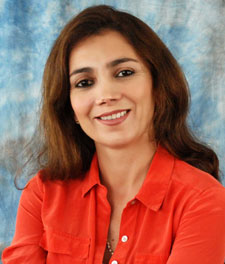|
Scleroderma Foundation, ATS Award $80,000 to Dr. Cecilia Sanchez for Scleroderma Research The Scleroderma Foundation and ATS Foundation have awarded $80,000 to Cecilia Sanchez, Ph.D., an Assistant Professor of Pulmonary Diseases at Tulane University, to conduct research in scleroderma-associated lung disease.
As part of her project, Dr. Sanchez hopes to build upon nascent autophagy research and conclusively demonstrate that stimulating autophagy helps prevent fibrosis. “Our overarching goal is to show that Nelfinavir can be an effective new treatment for systemic fibrosis in SSc patients, and our evidence will be especially compelling if we can show that it attacks the disease through two mechanisms,” Dr. Sanchez explains. “If we can establish its efficacy on the microscopic level, we expect that this drug, which is already used safely to treat other conditions, will move swiftly through human trials.” SSc patients, thus, may soon have a drug that reduces the progression and potentially reverses systemic fibrosis. The ATS Foundation (foundation.thoracic.org) and Scleroderma Foundation (scleroderma.org) provided funding for Dr. Sanchez's research. The ATS Foundation has supported over $10 million in grants to early career investigators conducting research in lung disease since 2002. The Scleroderma Foundation budgets approximately $1 million a year to support scleroderma research—and has provided over $18 million in grant funding since 1998. It also provides advocacy for and education to the patients it supports. Together, these foundations are making strides towards a cure for lung disease during a time of limited federal research funding. |
|
|
Back
Understanding Scleroderma
Back
Treating Scleroderma
Back
Living Well with Scleroderma
Back
Advancing Research and Treatment
Back
Get Involved



 Patients
with systemic scleroderma (SSc) frequently have fibrosis, or scarring, of the
lung and skin, which leads to reduced respiratory function, disability, and
early death. Recommended therapy for
treating fibrosis in SSc patients has limited efficacy and significant side
effects. Dr. Sanchez will assess whether
an FDA-approved drug (nelfinavir) can be repurposed to treat fibrosis. Nelfinavir blocks major signal pathways that
are well-known to lead to fibrosis and increases autophagy, a biological
process that may reduce scarring.
Patients
with systemic scleroderma (SSc) frequently have fibrosis, or scarring, of the
lung and skin, which leads to reduced respiratory function, disability, and
early death. Recommended therapy for
treating fibrosis in SSc patients has limited efficacy and significant side
effects. Dr. Sanchez will assess whether
an FDA-approved drug (nelfinavir) can be repurposed to treat fibrosis. Nelfinavir blocks major signal pathways that
are well-known to lead to fibrosis and increases autophagy, a biological
process that may reduce scarring.